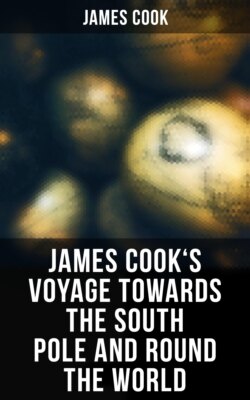Читать книгу James Cook's Voyage Towards the South Pole and Round the World - James Cook - Страница 54
На сайте Литреса книга снята с продажи.
1773 May
ОглавлениеKnowing that scurvy-grass, celery, and other vegetables, were to be found in this sound, I went myself the morning after my arrival, at day-break, to look for some, and returned on board at breakfast with a boat-load. Being now satisfied, that enough was to be got for the crews of both ships, I gave orders that they should be boiled, with wheat and portable broth, every morning for breakfast; and with peas and broth for dinner; knowing from experience, that these vegetables, thus dressed, are extremely beneficial, in removing all manner of scorbutic complaints.
I have already mentioned a desire I had of visiting Van Diemen's Land, in order to inform myself if it made a part of New Holland; and I certainly should have done this, had the winds proved favourable. But as Captain Furneaux had now, in a great measure, cleared up that point, I could have no business there; and therefore came to a resolution to continue our researches to the east, between the latitudes of 41° and 46°. I acquainted Captain Furneaux therewith, and ordered him to get his ship in readiness to put to sea as soon as possible.
In the morning of the 20th, I sent ashore, to the watering-place near the Adventure's tent, the only ewe and ram remaining, of those which I brought from the Cape of Good Hope, with an intent to leave them in this country. Soon after I visited the several gardens Captain Furneaux had caused to be made and planted with various articles; all of which were in a flourishing state, and, if attended to by the natives, may prove of great utility to them. The next day I set some men to work to make a garden on Long Island, which I planted with garden seeds, roots, &c.
On the 22d in the morning, the ewe and ram, I had with so much care and trouble brought to this place, were both found dead, occasioned, as was supposed, by eating some poisonous plant. Thus my hopes of stocking this country with a breed of sheep, were blasted in a moment. About noon, we were visited, for the first time since I arrived, by some of the natives, who dined with us; and it was not a little they devoured. In the evening they were dismissed with presents.
Early in the morning of the 24th, I sent Mr. Gilbert the master to sound about the rock we had discovered in the entrance of the sound. Myself, accompanied by Captain Furneaux and Mr. Forster, went in a boat to the west bay on a shooting party. In our way, we met a large canoe in which were fourteen or fifteen people. One of the first questions they asked was for Tupia, the person I brought from Otaheite on my former voyage; and they seemed to express some concern when we told them he was dead. These people made the same enquiry of Captain Furneaux when he first arrived; and, on my return to the ship in the evening, I was told that a canoe had been along- side, the people in which seemed to be strangers, and who also enquired for Tupia. Late in the evening Mr. Gilbert returned, having sounded all round the rock, which he found to be very small and steep.
Nothing worthy of notice happened till the 29th, when several of the natives made us a visit, and brought with them a quantity of fish, which they exchanged for nails, &c. One of these people I took over to Motuara, and shewed him some potatoes planted there by Mr. Fannen, master of the Adventure. There seemed to be no doubt of their succeeding; and the man was so well pleased with them, that he, of his own accord, began to hoe the earth up about the plants. We next took him to the other gardens, and shewed him the turnips, carrots, and parsnips; roots which, together with the potatoes, will be of more real use to them than all the other articles we had planted. It was easy to give them an idea of these roots, by comparing them with such as they knew.
Two or three families of these people now took up their abode near us, employing themselves daily in fishing, and supplying us with the fruits of their labour; the good effects of which we soon felt. For we were, by no means, such expert fishers as they are; nor were any of our methods of fishing equal to theirs.
